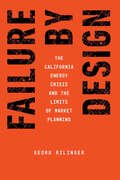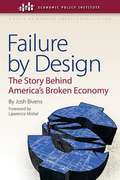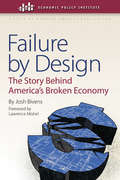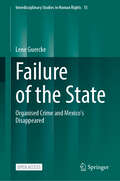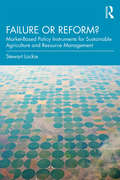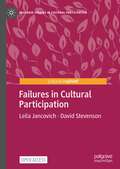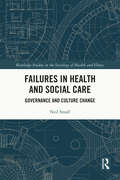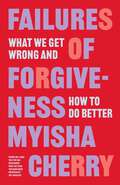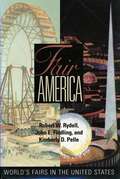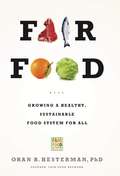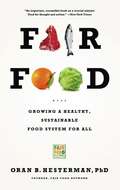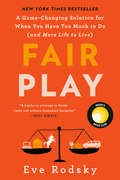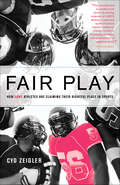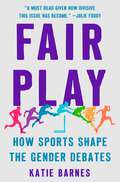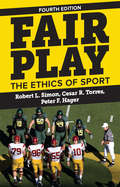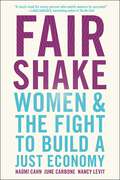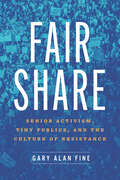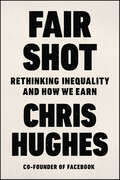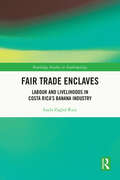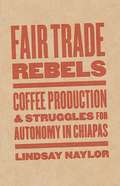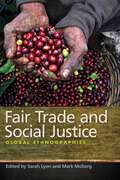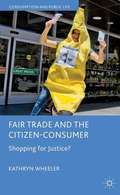- Table View
- List View
Failure by Design: The California Energy Crisis and the Limits of Market Planning
by Georg RilingerA new framework for studying markets as the product of organizational planning and understanding the practical limits of market design. The Western energy crisis was one of the great financial disasters of the past century. The crisis began in April 2000, when price spikes started to rattle California’s electricity markets. Decades later, some blame economic fundamentals and ignorant politicians, while others accuse the energy sellers who raided the markets. In Failure by Design, sociologist Georg Rilinger offers a different explanation, one that focuses on the practical challenges of market design. The unique physical attributes of electricity made it exceedingly difficult to introduce markets into the coordination of the electricity system, so market designers were brought in to construct the infrastructures that coordinate how market participants interact. An exercise in social engineering, these infrastructures were intended to guide market actors toward behavior that would produce optimal market results and facilitate grid management. Yet, though these experts spent their days worrying about incentive misalignment and market manipulation, they unintentionally created a system riddled with opportunities for destructive behavior. Rilinger’s analysis not only illuminates the California energy crisis but also develops a broader theoretical framework for thinking about markets as the products of organizational planning and the limits of social engineering, contributing broadly to sociological and economic thinking about the nature of markets.
Failure by Design: The Story Behind America's Broken Economy
by Josh Bivens Lawrence MishelWith this book, the Economic Policy Institute, a nonprofit think-tank focusing on the economic conditions of low- and middle-income workers, for the first time presents its data in the form of a readable narrative and interpretation written especially for general readers and students, made accessible with numerous charts and graphs. Bivens, an economist at the Economic Policy Institute and a frequent commentator for major media outlets, demonstrates that the Great Recession of 2008 was "driven by cluelessness and greed on the part of the country's financial elite," focusing on poor policy choices since the late 1970s. He examines the causes and impact of the Great Recession and explains evidence on jobs, incomes, wages, and other factors most relevant to low- and middle-income workers. He also describes what remains to be done to reform exchange rate, monetary, and fiscal policies. A companion website, "The State of Working America," provides the think-tank's annual compilations of economic data in interactive, downloadable charts and graphs, along with detailed readings on topics such as income inequality. The book lacks a subject index. IRL Press is an imprint of Cornell University Press. Annotation ©2011 Book News, Inc. , Portland, OR (booknews. com)
Failure by Design: The Story behind America's Broken Economy (Economic Policy Institute)
by Josh BivensIn Failure by Design, the Economic Policy Institute's Josh Bivens takes a step back from the acclaimed State of Working America series, building on its wealth of data to relate a compelling narrative of the U. S. economy's struggle to emerge from the Great Recession of 2008. Bivens explains the causes and impact on working Americans of the most catastrophic economic policy failure since the 1920s. As outlined clearly here, economic growth since the late 1970s has been slow and inequitably distributed, largely as a result of poor policy choices. These choices only got worse in the 2000s, leading to an anemic economic expansion. What growth we did see in the economy was fueled by staggering increases in private-sector debt and a housing bubble that artificially inflated wealth by trillions of dollars. As had been predicted, the bursting of the housing bubble had disastrous consequences for the broader economy, spurring a financial crisis and a rise in joblessness that dwarfed those resulting from any recession since the Great Depression. The fallout from the Great Recession makes it near certain that there will be yet another lost decade of income growth for typical families, whose incomes had not been boosted by the previous decade's sluggish and localized economic expansion. In its broad narrative of how the economy has failed to deliver for most Americans over much of the past three decades, Failure by Design also offers compelling graphic evidence on jobs, incomes, wages, and other measures of economic well-being most relevant to low- and middle-income workers. Josh Bivens tracks these trends carefully, giving a lesson in economic history that is readable yet rigorous in its analysis. Intended as both a stand-alone volume and a companion to the new State of Working America website that presents all of the data underlying this cogent analysis, Failure by Design will become required reading as a road map to the economic problems that confront working Americans.
Failure of the State: Organised Crime and Mexico's Disappeared (Interdisciplinary Studies in Human Rights #15)
by Lene GuerckeThis Open Access book explores an issue that has received little attention in human rights research: organised criminal groups (OCGs) as perpetrators of human rights violations, especially disappearances. It takes an interdisciplinary approach, combining doctrinal legal research with a qualitative study on present-day disappearances in Mexico. Disappearances are a complex human rights violation that impacts not only the disappeared person but also their relatives, who are left in a limbo of uncertainty about their loved one’s fate. Originally part of state-led repression, today disappearances occur in varied contexts, often involving OCGs and other non-state actors. However, disappearances committed by non-state actors are not human rights violations under International Human Rights Law (IHRL), thereby potentially leaving a gap in the legal protection of victims. The book first analyses state obligations and case law involving state responsibility for human rights violations committed by non-state actors and applies the analysis to OCGs. This ‘internal’ legal perspective is complemented by an ‘external’ study based on interviews with human rights practitioners working on disappearances in Mexico, which often involve OCGs. The qualitative study offers a unique perspective on human rights protection ‘in reality’. The book adds to scholarship on non-state actors and disappearances, and to incipient international legal scholarship on the issue of organised crime and international law. Moreover, the study on Mexico provides a richer understanding of challenges faced by practitioners ‘on the ground’ where OCGs commit human rights violations alongside, or in collusion with, state forces and against the backdrop of an overall failure of the state. The book may be of interest to a diverse audience, including legal scholars and practitioners, human rights scholars in fields such as political science, international relations, or socio-legal studies, as well as funders supporting the work of NGOs in Mexico and similar contexts, and NGOs themselves.
Failure or Reform?: Market-Based Policy Instruments for Sustainable Agriculture and Resource Management
by Stewart LockieMarket reform promises more environmental protection and more profitable agriculture at lower financial cost. Too good to be true? This book examines numerous empirical examples of policy in action to identify principles for the successful application of market-based policy instruments. Where some market instruments are used to fix market failures by putting a value on environmental protection, others use market-like mechanisms to allocate financial incentives for environmental work. They are promoted as flexible, efficient and politically neutral solutions to the competing demands of social, economic and ecological sustainability. But they also attract criticism for rolling back environmental regulation and privatizing public goods. This book argues that while many market-based instruments have merit, decisions about responsibility cannot be left entirely to the market. Whichever instruments we use, decision-making needs to be embedded in a logic of democratization. Using case studies from around the world, this book investigates how instruments like eco-standards, payments for ecosystem services, pollution trading and community-based natural resource management perform in practice, and what can be learned about applying them more effectively. While the approach is primarily sociological, it is deliberately written to bridge the gap between sociology, economics, environmental sciences and the concerns of environmental policy makers.
Failures in Cultural Participation (Palgrave Studies in Cultural Participation)
by David Stevenson Leila JancovichThis open access book examines how and why the UK's approach towards increasing cultural participation has largely failed to address inequality and inequity in the subsidised cultural sector despite long-standing international policy discourse on this issue. It further examines why meaningful change in cultural policy has not been more forthcoming in the face of this apparent failure. This work examines how a culture of mistrust, blame, and fear between policymakers, practitioners, and participants has resulted in a policy environment that engenders overstated aims, accepts mediocre quality evaluations, encourages narratives of success, and lacks meaningful critical reflection. It shows through extensive field work with cultural professionals and participants how the absence of criticality, transparency, and honesty limits the potential for policy learning, which the authors argue is a precondition to any radical policy change and is necessary for developing a greater understanding of the social construction of policy problems. The book presents a new framework that encourages more open and honest conversations about failure in the cultural sector to support learning strategies that can help avoid these failures in the future.
Failures in Health and Social Care: Governance and Culture Change
by Neil SmallThis thought-provoking book examines breakdowns in the quality of health and social care over the past decade, exploring governance failures and the challenges of achieving lasting change. Failures in care have been manifest across many different settings. Drawing on examples from care of older people and end-of-life care, as well as from learning disabilities, mental health, maternity care and services for vulnerable children, Neil Small shows that the same sorts of problems are evident across these settings and that they are occurring up to the present day. Discussing culture change alongside levels of funding and the impact of prevailing political and economic orthodoxies, and through the lens of shifts of trust in society, this book argues that the concept of culture must be cast much wider than organisational and professional cultures if change is to be secured. This book engages with how to improve quality of care in the NHS and welfare systems more generally. Its case examples are from the UK but the issues of governance, culture change and shifts in the social contract that failures illuminate have an international relevance. It is important reading for those with an interest in health, social care, political science, and sociology.
Failures of Forgiveness: What We Get Wrong and How to Do Better
by Myisha CherryPhilosopher Myisha Cherry teaches us the right ways to deal with wrongdoing in our lives and the worldSages from Cicero to Oprah have told us that forgiveness requires us to let go of negative emotions and that it has a unique power to heal our wounds. In Failures of Forgiveness, Myisha Cherry argues that these beliefs couldn’t be more wrong—and that the ways we think about and use forgiveness, personally and as a society, can often do more harm than good. She presents a new and healthier understanding of forgiveness—one that will give us a better chance to recover from wrongdoing and move toward “radical repair.”Cherry began exploring forgiveness after some relatives of the victims of the mass shooting at Emanuel A.M.E. Church in Charleston, South Carolina, forgave what seemed unforgiveable. She was troubled that many observers appeared to be more inspired by these acts of forgiveness than they were motivated to confront the racial hatred that led to the killings. That is a big mistake, Cherry argues. Forgiveness isn’t magic. We can forgive and still be angry, there can be good reasons not to forgive, and forgiving a wrong without tackling its roots solves nothing. Examining how forgiveness can go wrong in families, between friends, at work, and in the media, politics, and beyond, Cherry addresses forgiveness and race, canceling versus forgiving, self-forgiveness, and more. She takes the burden of forgiveness off those who have been wronged and offers guidance both to those deciding whether and how to forgive and those seeking forgiveness.By showing us how to do forgiveness better, Failures of Forgiveness promises to transform how we deal with wrongdoing in our lives, opening a new path to true healing and reconciliation.
Fair America: World's Fairs in the United States
by Kimberly Pelle John E. Findling Robert W. RydellSince their inception with New York's Crystal Palace Exhibition in the mid-nineteenth century, world's fairs have introduced Americans to "exotic" pleasures such as belly dancing and the Ferris Wheel; pathbreaking technologies such as telephones and X rays; and futuristic architectural, landscaping, and transportation schemes. Billed by their promoters as "encyclopedias of civilization," the expositions impressed tens of millions of fairgoers with model environments and utopian visions.Setting more than 30 world's fairs from 1853 to 1984 in their historical context, the authors show that the expositions reflected and influenced not only the ideals but also the cultural tensions of their times. As mainstays rather than mere ornaments of American life, world's fairs created national support for such issues as the social reunification of North and South after the Civil War, U.S. imperial expansion at the turn of the 20th-century, consumer optimism during the Great Depression, and the essential unity of humankind in a nuclear age.
Fair Food
by Oran B. HestermanA host of books and films in recent years have documented the dangers of our current food system, from chemical runoff to soaring rates of diet-related illness to inhumane treatment of workers and animals. But advice on what to do about it largely begins and ends with the admonition to "eat local or "eat organic." Fair Food is an enlightening and inspiring guide to changing not only what we eat, but how food is grown, packaged, delivered, marketed, and sold. Oran B. Hesterman shows how our system's dysfunctions are unintended consequences of our emphasis on efficiency, centralization, higher yields, profit, and convenience--and defines the new principles, as well as the concrete steps, necessary to restructuring it. Along the way, he introduces people and organizations across the country who are already doing this work in a number of creative ways, from bringing fresh food to inner cities to fighting for farm workers' rights to putting cows back on the pastures where they belong. He provides a wealth of practical information for readers who want to get more involved.
Fair Food: Growing a Healthy, Sustainable Food System for All
by Oran HestermanOur food system is broken, and it’s endangering what’s most precious to us: our environment, our health, our soil and water, and our future. In recent years, a host of books and films have compellingly documented the dangers. But advice on what to do about them largely begins and ends with the admonition to "eat local” or "eat organic. ” Longtime good food pioneer Oran Hesterman knows that we can’t fix the broken system simply by changing what’s on our own plates: the answer lies beyond the kitchen. InFair Foodhe shares an inspiring and practical vision for changing not only what we eat, but how food is grown, packaged, delivered, marketed, and sold. He introduces people and organizations across the country who are already doing this work in a number of creative ways, and provides a wealth of practical information for readers who want to get more involved.
Fair Play: A Game-Changing Solution for When You Have Too Much to Do (and More Life to Live) (Reese's Book Club)
by Eve RodskyA REESE'S BOOK CLUB PICK "A hands-on, real talk guide for navigating the hot-button issues that so many families struggle with."--Reese Witherspoon Tired, stressed, and in need of more help from your partner? Imagine running your household (and life!) in a new way...It started with the Sh*t I Do List. Tired of being the "shefault" parent responsible for all aspects of her busy household, Eve Rodsky counted up all the unpaid, invisible work she was doing for her family -- and then sent that list to her husband, asking for things to change. His response was... underwhelming. Rodsky realized that simply identifying the issue of unequal labor on the home front wasn't enough: She needed a solution to this universal problem. Her sanity, identity, career, and marriage depended on it. The result is Fair Play: a time- and anxiety-saving system that offers couples a completely new way to divvy up chores and responsibilities. Rodsky interviewed more than five hundred men and women from all walks of life to figure out what the invisible work in a family actually entails and how to get it all done efficiently. With four easy-to-follow rules, 100 household tasks, and a series of conversation starters for you and your partner, Fair Play helps you prioritize what's important to your family and who should take the lead on every chore from laundry to homework to dinner. "Winning" this game means rebalancing your home life, reigniting your relationship with your significant other, and reclaiming your Unicorn Space -- as in, the time to develop the skills and passions that keep you interested and interesting. Stop drowning in to-dos and lose some of that invisible workload that's pulling you down. Are you ready to try Fair Play? Let's deal you in.
Fair Play: How LGBT Athletes Are Claiming Their Rightful Place in Sports
by Cyd ZeiglerZeigler tells the story of how sports has been radically transformed for LGBT athletes in the past four years.“Fair Play presents LGBT history and shows how far the movement has come. It’s also an important scrapbook of past and present-day gay athletes who have bravely tested America’s social climate and come out, even when their careers were at risk.” —Bay Area ReporterWhen Cyd Zeigler started writing about LGBT sports issues in 1999, no one wanted to talk about them. Today, this is a central conversation in American society that reverberates throughout the sports world and beyond.In Fair Play, Zeigler tells the story of how sports have transformed for LGBT athletes, diving into key moments and issues that have shaped sports for LGBT people today. He shares intimate behind-the-scenes details about various athletes and stories—including NFL Hall of Famer Michael Irvin, transgender MMA fighter Fallon Fox, and NFL hopeful Michael Sam, among others—along with contextual insights about elite sports, including the overhyped “distraction” myth surrounding gay athletes.Always the forward-thinker, Zeigler maps out the necessary steps to complete sports’ transformation and fully open athletics to LGBT people.Political sportswriter and Edge of Sports imprint curator Dave Zirin (the Nation) has never shied away from criticizing that which die-hard sports fans hold dear. The Edge of Sports titles will address issues across many different sports—football, basketball, swimming, tennis, etc.—and at both the professional and nonprofessional/collegiate levels. Furthermore, Zirin brings to the table select stories of athletes’ journeys and what they are facing and how they evolve both in their sport as well as against the greater backdrop of one’s life’s odyssey.
Fair Play: How Sports Shape the Gender Debates
by Katie BarnesA richly reported and provocative look at the history of women’s sports and the controversy surrounding trans athletes by a leading LGBTQ+ sports journalist.For decades women have been playing competitive sports, thanks in large part to the protective cover of Title IX. Since the passage of that law, the number of women participating in sports and the level of competition in high school and college and professionally, has risen dramatically. In Fair Play, award-winning journalist Katie Barnes traces the evolution of women’s sports as a pastime and a political arena where equality and fairness have been fought over for generations. As attitudes toward gender have shifted to embrace more fluidity in recent decades, sex continues to be viewed as a static binary that is easily determined: male or female. It is on the very idea of static sex that we have built an entire sporting apparatus. Now that foundation is being hotly debated as a result of intense culture wars. Many transgender and intersex athletes, including a South African runner, a wrestler in Texas, a Connecticut track star, and a swimmer at the University of Pennsylvania, have captured the attention of law and policymakers who want to decide how and when they compete. Women’s sports, since their inception, have been seen as a separate class of competition that requires protection and rules for entry. But what are those rules and who gets to make them? Fair Play looks at all sides of the issue and presents a reasoned and much-needed solution that seeks to preserve opportunities for all going forward.
Fair Play: The Ethics of Sport
by Robert L. SimonAddressing both collegiate and professional sports, the updated edition of Fair Play: The Ethics of Sport explores the ethical presuppositions of competitive athletics and their connection both to ethical theory and to concrete moral dilemmas that arise in actual athletic competition. This fourth edition has been updated with new examples, including a discussion of Spygate by the New England Patriots and recent discoveries on the use of performance enhancing drugs by top athletes. Two additional authors, Cesar R. Torres and Peter F. Hager, bring to this edition a discussion of the moral issues involved in youth sports and the ethics of being a fan, as well as a fresh perspective on the theories of broad internalism and the quest for excellence. Furthermore, major criticisms of broad internalism by philosophers William J. Morgan and Scott Kretchmar add a new dimension to the discussion on the moral foundations of winning.
Fair Sex, Savage Dreams: Race, Psychoanalysis, Sexual Difference
by Jean WaltonIn Fair Sex, Savage Dreams Jean Walton examines the work of early feminist psychoanalytic writing to decipher in it the unacknowledged yet foundational role of race. Focusing on the 1920s and 1930s, a time when white women were actively refashioning Freud's problematic accounts of sexual subjectivity, Walton rereads in particular the writing of British analysts Joan Riviere and Melanie Klein, modernist poet H. D. , the eccentric French analyst Marie Bonaparte, and anthropologist Margaret Mead. Charting the fantasies of racial difference in these women's writings, Walton establishes that race--particularly during this period--was inseparable from accounts of gender and sexuality. While arguing that these women remained notably oblivious to the racial meanings embedded in their own attempts to rearticulate feminine sexuality, Walton uses these very blindspots to understand how race and sex are deeply imbricated in the constitution of subjectivity. Challenging the notion that subjects acquire gender identities in isolation from racial ones, she thus demonstrates how white-centered psychoanalytic theories have formed the basis for more contemporary feminist and queer explorations of fantasy, desire, power, and subjectivity. Fair Sex, Savage Dreams will appeal to scholars of psychoanalysis, literary and cinematic modernism, race studies, queer theory, feminist theory, and anthropology.
Fair Shake: Women and the Fight to Build a Just Economy
by June Carbone Naomi Cahn Nancy LevitA stirring, comprehensive look at the state of women in the workforce—why women&’s progress has stalled, how our economy fosters unproductive competition, and how we can fix the system that holds women back.In an era of supposed great equality, women are still falling behind in the workplace. Even with more women in the workforce than in decades past, wage gaps continue to increase. It is the most educated women who have fallen the furthest behind. Blue-collar women hold the most insecure and badly paid jobs in our economy. And even as we celebrate high-profile representation—women on the board of Fortune 500 companies and our first female vice president—women have limited recourse when they experience harassment and discrimination. Fair Shake: Women and the Fight to Build a Just Economy explains that the system that governs our economy—a winner-take-all economy—is the root cause of these myriad problems. The WTA economy self-selects for aggressive, cutthroat business tactics, which creates a feedback loop that sidelines women. The authors, three legal scholars, call this feedback loop &“the triple bind&”: if women don&’t compete on the same terms as men, they lose; if women do compete on the same terms as men, they&’re punished more harshly for their sharp elbows or actual misdeeds; and when women see that they can&’t win on the same terms as men, they take themselves out of the game (if they haven&’t been pushed out already). With odds like these stacked against them, it&’s no wonder women feel like, no matter how hard they work, they can&’t get ahead. Fair Shake is not a &“fix the woman&” book; it&’s a &“fix the system&” book. It not only diagnoses the problem of what's wrong with the modern economy, but shows how, with awareness and collective action, we can build a truly just economy for all.
Fair Share: Senior Activism, Tiny Publics, and the Culture of Resistance
by Gary Alan FineA deeply researched ethnographic portrait of progressive senior activists in Chicago who demonstrate how a tiny public wields collective power to advocate for broad social change. If you've ever been to a protest or been involved in a movement for social change, you have likely experienced a local culture, one with slogans, jargon, and shared commitments. Though one might think of a cohort of youthful organizers when imagining protest culture, this powerful ethnography from esteemed sociologist Gary Alan Fine explores the world of senior citizens on the front lines of progressive protests. While seniors are a notoriously important—and historically conservative—political cohort, the group Fine calls “Chicago Seniors Together” is a decidedly leftist organization, inspired by the model of Saul Alinsky. The group advocates for social issues, such as affordable housing and healthcare, that affect all sectors of society but take on a particular urgency in the lives of seniors. Seniors connect and mobilize around their distinct experiences but do so in service of concerns that extend beyond themselves. Not only do these seniors experience social issues as seniors—but they use their age as a dramatic visual in advocating for political change. In Fair Share, Fine brings readers into the vital world of an overlooked political group, describing how a “tiny public” mobilizes its demands for broad social change. In investigating this process, he shows that senior citizen activists are particularly savvy about using age to their advantage in social movements. After all, what could be more attention-grabbing than a group of passionate older people determinedly shuffling through snowy streets with canes, in wheelchairs, and holding walkers to demand healthcare equity, risking their own health in the process?
Fair Share: Senior Activism, Tiny Publics, and the Culture of Resistance
by Gary Alan FineA deeply researched ethnographic portrait of progressive senior activists in Chicago who demonstrate how a tiny public wields collective power to advocate for broad social change. If you've ever been to a protest or been involved in a movement for social change, you have likely experienced a local culture, one with slogans, jargon, and shared commitments. Though one might think of a cohort of youthful organizers when imagining protest culture, this powerful ethnography from esteemed sociologist Gary Alan Fine explores the world of senior citizens on the front lines of progressive protests. While seniors are a notoriously important—and historically conservative—political cohort, the group Fine calls “Chicago Seniors Together” is a decidedly leftist organization, inspired by the model of Saul Alinsky. The group advocates for social issues, such as affordable housing and healthcare, that affect all sectors of society but take on a particular urgency in the lives of seniors. Seniors connect and mobilize around their distinct experiences but do so in service of concerns that extend beyond themselves. Not only do these seniors experience social issues as seniors—but they use their age as a dramatic visual in advocating for political change. In Fair Share, Fine brings readers into the vital world of an overlooked political group, describing how a “tiny public” mobilizes its demands for broad social change. In investigating this process, he shows that senior citizen activists are particularly savvy about using age to their advantage in social movements. After all, what could be more attention-grabbing than a group of passionate older people determinedly shuffling through snowy streets with canes, in wheelchairs, and holding walkers to demand healthcare equity, risking their own health in the process?
Fair Share: Senior Activism, Tiny Publics, and the Culture of Resistance
by Gary Alan FineA deeply researched ethnographic portrait of progressive senior activists in Chicago who demonstrate how a tiny public wields collective power to advocate for broad social change. If you've ever been to a protest or been involved in a movement for social change, you have likely experienced a local culture, one with slogans, jargon, and shared commitments. Though one might think of a cohort of youthful organizers when imagining protest culture, this powerful ethnography from esteemed sociologist Gary Alan Fine explores the world of senior citizens on the front lines of progressive protests. While seniors are a notoriously important—and historically conservative—political cohort, the group Fine calls “Chicago Seniors Together” is a decidedly leftist organization, inspired by the model of Saul Alinsky. The group advocates for social issues, such as affordable housing and healthcare, that affect all sectors of society but take on a particular urgency in the lives of seniors. Seniors connect and mobilize around their distinct experiences but do so in service of concerns that extend beyond themselves. Not only do these seniors experience social issues as seniors—but they use their age as a dramatic visual in advocating for political change. In Fair Share, Fine brings readers into the vital world of an overlooked political group, describing how a “tiny public” mobilizes its demands for broad social change. In investigating this process, he shows that senior citizen activists are particularly savvy about using age to their advantage in social movements. After all, what could be more attention-grabbing than a group of passionate older people determinedly shuffling through snowy streets with canes, in wheelchairs, and holding walkers to demand healthcare equity, risking their own health in the process?
Fair Shot: Rethinking Inequality and How We Earn
by Chris Hughes"...deeply felt and cogently argued...Hughes makes a powerful case that deserves a respectful hearing." —The Financial TimesFacebook co-founder Chris Hughes argues that the best way to fight income inequality is with a radically simple idea: a guaranteed income for working people, paid for by the one percent.The first half of Chris Hughes’s life played like a movie reel right out of the “American Dream.” He grew up in a small town in North Carolina. His parents were people of modest means, but he was accepted into an elite boarding school and then Harvard, both on scholarship. There, he met Mark Zuckerberg and Dustin Moskovitz and became one of the co-founders of Facebook. In telling his story, Hughes demonstrates the powerful role fortune and luck play in today’s economy. Through the rocket ship rise of Facebook, Hughes came to understand how a select few can become ultra-wealthy nearly overnight. He believes the same forces that made Facebook possible have made it harder for everyone else in America to make ends meet. To help people who are struggling, Hughes proposes a simple, bold solution: a guaranteed income for working people, including unpaid caregivers and students, paid for by the one percent. The way Hughes sees it, a guaranteed income is the most powerful tool we have to combat poverty and stabilize America’s middle class. Money—cold hard cash with no strings attached—gives people freedom, dignity, and the ability to climb the economic ladder. A guaranteed income for working people is the big idea that's missing in the national conversation. This book, grounded in Hughes’s personal experience, will start a frank conversation about how we earn in modern America, how we can combat income inequality, and ultimately, how we can give everyone a fair shot.
Fair Trade Enclaves: Labour and Livelihoods in Costa Rica’s Banana Industry (Routledge Studies in Anthropology)
by Layla Zaglul RuizFair Trade Enclaves tells the story of exploitation and inequality in the production of Fair Trade bananas. It draws on immersive fieldwork in Costa Rica, which was the original testing ground for US-owned plantations and is today the world’s third-largest exporter of bananas. The book offers an ethnographic study of Fair Trade’s impact on the ‘Dollar’ banana system and considers how the growth in Fair Trade affects workers’ livelihoods at the source of production. It documents the labour conditions and daily struggles of Costa Rican banana workers, featuring a comparative anthropological assessment of Fair Trade and conventional farms. The chapters provide a window onto Fair Trade’s ability to effect change within one of the world’s most exploitative and enduring commodity chains, exposing how Fair Trade currently fails to challenge the structural exploitation of banana production within the dollar system. The author reveals how, in some respects, workers at the conventional farm enjoy better conditions compared with those employed on the Fair Trade farm. The book is valuable reading for scholars of Anthropology, Development, and Latin American Studies.
Fair Trade Rebels: Coffee Production and Struggles for Autonomy in Chiapas (Diverse Economies and Livable Worlds)
by Lindsay NaylorReassessing interpretations of development with a new approach to fair trade Is fair trade really fair? Who is it for, and who gets to decide? Fair Trade Rebels addresses such questions in a new way by shifting the focus from the abstract concept of fair trade—and whether it is &“working&”—to the perspectives of small farmers. It examines the everyday experiences of resistance and agricultural practice among the campesinos/as of Chiapas, Mexico, who struggle for dignified livelihoods in self-declared autonomous communities in the highlands, confronting inequalities locally in what is really a global corporate agricultural chain.Based on extensive fieldwork, Fair Trade Rebels draws on stories from Chiapas that have emerged from the farmers&’ interaction with both the fair-trade–certified marketplace and state violence. Here Lindsay Naylor discusses the racialized and historical backdrop of coffee production and rebel autonomy in the highlands, underscores the divergence of movements for fairer trade and the so-called alternative certified market, traces the network of such movements from the highlands and into the United States, and evaluates existing food sovereignty and diverse economic exchanges. Putting decolonial thinking in conversation with diverse economies theory, Fair Trade Rebels evaluates fair trade not by the measure of its success or failure but through a unique, place-based approach that expands our understanding of the relationship between fair trade, autonomy, and economic development.
Fair Trade and Social Justice: Global Ethnographies
by Mark MobergBy 2008, total Fair Trade purchases in the developed world reached nearly $3 billion, a five-fold increase in four years. Consumers pay a “fair price” for Fair Trade items, which are meant to generate greater earnings for family farmers, cover the costs of production, and support socially just and environmentally sound practices. Yet constrained by existing markets and the entities that dominate them, Fair Trade often delivers material improvements for producers that are much more modest than the profound social transformations the movement claims to support.There has been scant real-world assessment of Fair Trade’s effectiveness. Drawing upon fine-grained anthropological studies of a variety of regions and commodity systems including Darjeeling tea, coffee, crafts, and cut flowers, the chapters in Fair Trade and Social Justice represent the first works to use ethnographic case studies to assess whether the Fair Trade Movement is actually achieving its goals.Contributors: Julia Smith, Mark Moberg, Catherine Ziegler , Sarah Besky, Sarah M. Lyon, Catherine S. Dolan, Patrick C. Wilson, Faidra Papavasiliou, Molly Doane, Kathy M’Closkey, Jane Henrici
Fair Trade and the Citizen Consumer
by Kathryn WheelerAs sales of fair-trade goods explode across the globe, Fair Trade and the Citizen-Consumer provides a timely analysis of the organizations, institutions and grassroots networks behind this growing movement. Drawing on examples from the UK, Sweden and USA, this book moves away from models of individualized consumer choice and instead explores the collective cultures and practices that motivate and sustain fair-trade consumer behaviour. Although the fair-trade citizen-consumer has been called to action and publicly represented as an individual 'voting' in the marketplace, this book reveals how market interventions are editing the choices available to consumers, at the same time as 'Fairtrade Town' consumer networks are flourishing. Offering new and critical insights into the fair-trade success story, this book also contributes to debates about sustainable consumption behaviour and the growth of 'new' forms of political participation and citizenship.
